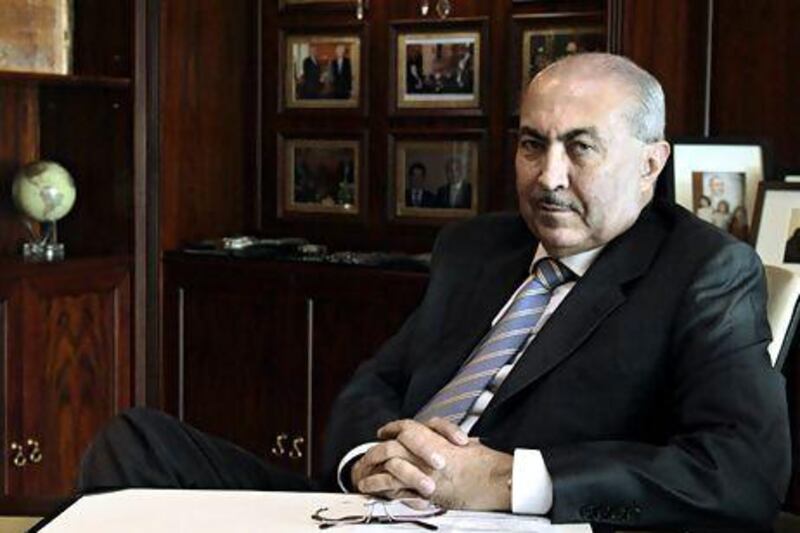The sudden loss of a dear relative is a tragedy for any family. In the Middle East commercial world, where many businesses are family owned and run, an unexpected bereavement can have corporate repercussions that compound the emotional anguish.
Fouad Makhzoumi and his family went through such a convulsion in April 2011 with the sudden death of his son Rami. One moment the 33-year-old was at the helm of the family business, Future Pipe, where he was the chief executive; a few hours later, the Makhzoumi family was mourning the passing of the heir to a business painstakingly built up over decades.
"I have always looked to the future with my beloved son Rami taking the lead, not only in business but for the family too … But fate was stronger than hopes and dreams," wrote Mr Makhzoumi in a book produced by his family, one of the region's most successful business dynasties.
The book is partly a homage to Rami's life and achievements, and partly a business manual for the modernisation of traditional Arab businesses.
In Mr Makhzoumi's offices in Dubai, the legacy of Rami is all around; pictures of the young man adorn the walls; his office has been left exactly as it was on that awful day in 2011. He has obviously felt the loss of his son grievously.
"Rami was a special character. Leading for him was not a right, it was a responsibility," Mr Makhzoumi says. "He wanted to change a 20th-century mentality into a more modern one, and integrate the new generation with the Ancien Régime. He wanted to change the image of young Arabs in the world."
Rami's stewardship of the multimillion-pound corporation Future Pipe was the mechanism through which he hoped to bring about such a transformation.
The business had its origins in Saudi Arabia in the 1970s, where the family, already prominent in politics and commerce in their native Lebanon, had relocated at the beginning of the Lebanese civil war.
Mr Makhzoumi had built the company into a world leader in the fast-growing business of manufacturing and selling fibreglass pipes, used in all sectors of industry from oil to utilities to water desalination. "For each newborn baby, you need two pipes," he says, echoing the industry's motto.
By the turn of the millennium, Future Pipe had become one of the top three players in its sector, replacing older concrete or metal equipment with a more adaptable, higher value added, product.
"I wanted to retire when I was 50 in 2002, so I convinced Rami to take over the business, though it wasn't a hard sell. I was convinced he could do it." Then aged 25, Rami had already been learning his father's trade for many years, accompanying him to meet global business and political leaders.
He had also made a Hajj pilgrimage to Mecca with his mother, and learnt the Quran in Arabic, complementing the education he had gained at school and university in Britain.
The young chief executive brought a new approach and dynamism to the company.
"His key attribute was that he had sincere business and social ethics, and a commitment to corporate governance," says Mr Makhzoumi. Rami decided that an initial public offering was the way to ensure the company's future - imposing it to a modern and professional corporate discipline.
Within a few years he had begun to put in place the structure of a public company, and by 2006 he was beginning to seriously plan for an IPO some time in 2008.
By then, the world had changed from the boom years of the first part of the decade. In late 2007, DP World had come to market in Dubai (Future Pipe's chosen location for its own IPO), a move that "sucked all the cash out of the market and destroyed liquidity," says Fouad Makhzoumi.
His son toyed briefly with the idea of a listing on the London Stock Exchange, but "by that summer, Rami grew increasingly convinced we should not do it [the IPO], and he was right. It was another example of his vision".
Like most sensible companies, Future Pipe hunkered down during the crisis and subsequent recession, but there were signs by 2011 that the young chief executive was beginning to think again of expansion, with a deal in Saudi Arabia on his mind. Until that day in April when fate intervened.
After a "healing process", Mr Makhzoumi believes the most fitting tribute would be to continue the modernisation and expansion strategy Rami began.
"I said I would run the company for three years after he passed away, so I'll be looking to step down towards the end of this year, though I might stay on as chairman," he says.
The process of looking outside the family for a new chief executive is already on his mind, as is a detailed strategy for expansion and acquisition, as well as a revival of the possible IPO.
"I want to enjoy my three grandchildren, Rami's daughters."
The CEO's Journey The Life and Leadership of Rami Makhzoumi, by Jacqueline Moore and Steven Sonsino, is published by Future Group





